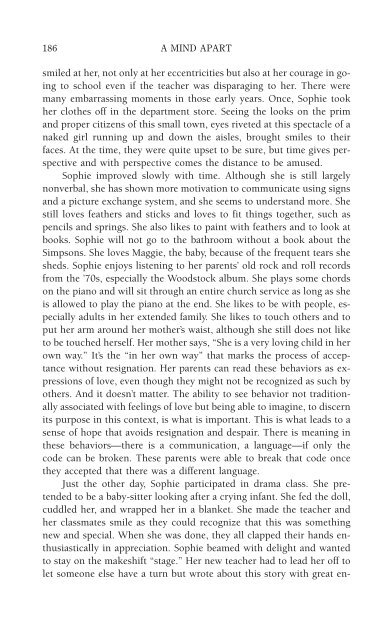978-1572305441
autism
autism
You also want an ePaper? Increase the reach of your titles
YUMPU automatically turns print PDFs into web optimized ePapers that Google loves.
186 A MIND APART<br />
smiled at her, not only at her eccentricities but also at her courage in going<br />
to school even if the teacher was disparaging to her. There were<br />
many embarrassing moments in those early years. Once, Sophie took<br />
her clothes off in the department store. Seeing the looks on the prim<br />
and proper citizens of this small town, eyes riveted at this spectacle of a<br />
naked girl running up and down the aisles, brought smiles to their<br />
faces. At the time, they were quite upset to be sure, but time gives perspective<br />
and with perspective comes the distance to be amused.<br />
Sophie improved slowly with time. Although she is still largely<br />
nonverbal, she has shown more motivation to communicate using signs<br />
and a picture exchange system, and she seems to understand more. She<br />
still loves feathers and sticks and loves to fit things together, such as<br />
pencils and springs. She also likes to paint with feathers and to look at<br />
books. Sophie will not go to the bathroom without a book about the<br />
Simpsons. She loves Maggie, the baby, because of the frequent tears she<br />
sheds. Sophie enjoys listening to her parents’ old rock and roll records<br />
from the ’70s, especially the Woodstock album. She plays some chords<br />
on the piano and will sit through an entire church service as long as she<br />
is allowed to play the piano at the end. She likes to be with people, especially<br />
adults in her extended family. She likes to touch others and to<br />
put her arm around her mother’s waist, although she still does not like<br />
to be touched herself. Her mother says, “She is a very loving child in her<br />
own way.” It’s the “in her own way” that marks the process of acceptance<br />
without resignation. Her parents can read these behaviors as expressions<br />
of love, even though they might not be recognized as such by<br />
others. And it doesn’t matter. The ability to see behavior not traditionally<br />
associated with feelings of love but being able to imagine, to discern<br />
its purpose in this context, is what is important. This is what leads to a<br />
sense of hope that avoids resignation and despair. There is meaning in<br />
these behaviors—there is a communication, a language—if only the<br />
code can be broken. These parents were able to break that code once<br />
they accepted that there was a different language.<br />
Just the other day, Sophie participated in drama class. She pretended<br />
to be a baby-sitter looking after a crying infant. She fed the doll,<br />
cuddled her, and wrapped her in a blanket. She made the teacher and<br />
her classmates smile as they could recognize that this was something<br />
new and special. When she was done, they all clapped their hands enthusiastically<br />
in appreciation. Sophie beamed with delight and wanted<br />
to stay on the makeshift “stage.” Her new teacher had to lead her off to<br />
let someone else have a turn but wrote about this story with great en-



